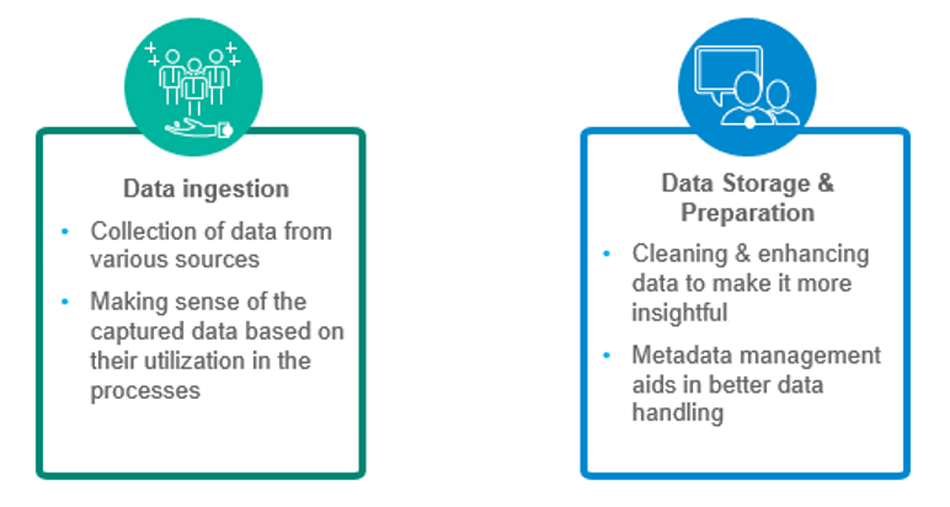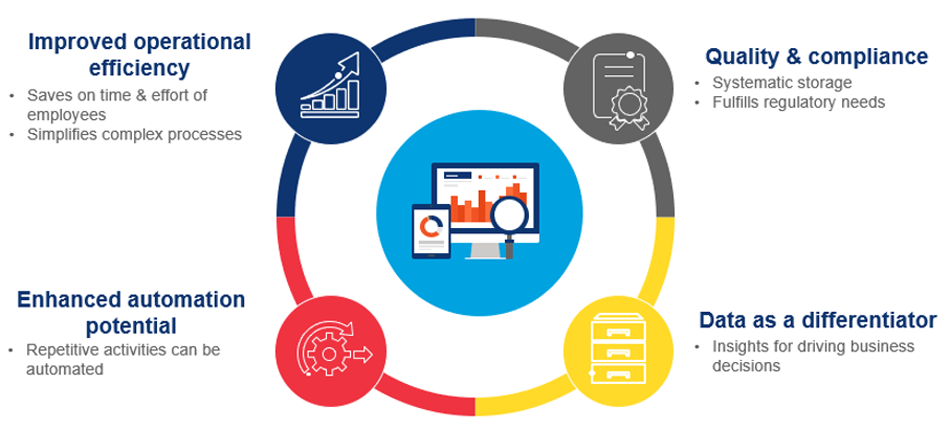April | 2021
Data is a highly valuable asset for any organization. It is the raw material to drive strategic decisions that are crucial to obtain operational optimization, gain invaluable customer insights, and forecast production and distribution.
With proliferation of data, data management has become a crucial aspect of the day-to-day functioning of organizations. New age technologies like analytics, in-memory computing, data cleansing etc. are becoming indispensable to gather insights. Moreover, one of the major aims of managing data effectively is to centralize its access, so that different departments from the organization have same-time access to it to drive collaborative and holistic efforts. Some of the ways to manage data effectively are:

Why is data management important?
Data management is the fundamental requirement for enabling subsequent processes of data crunching and analysis. Data and analytics have outpaced the broader IT services market growth and enterprises are focusing on modern technologies like AI and ML to ensure the availability of high quality data. If successfully implemented, data management can help in realizing long-term benefits such as:
a. Improved operational efficiency – As the data gets stored and sorted in a logical manner, processing becomes easier, hence reducing the time and complexity. This significantly saves the effort required in measuring, monitoring and remediating the data.
b. Enhances automation potential and business outcomes – Many of the data processing activities get automated because of the repetitive nature observed during the processing stages. Properly cleansed and classified data becomes a major source of determining descriptive, predictive and prescriptive measures for making changes in the business model to improve processes and outcomes.
c. Data quality and compliance – With the introduction of technologies like Artificial Intelligence, Machine Learning, Natural Language Processing etc. data ingestion, preparation and storing becomes quite systematic, this in turn improves the overall quality. Also, the prebuilt IP used during data management process helps in creating a robust system which is compliant with regulation perspective.
d. Data becomes a differentiator – For long, modus operandi has been to be compliant with the data management practices. But now, data management focuses at using data as a tool to provide valuable insights that can potentially be used to drive innovations.

Figure 2. Benefits of efficient data management
Data Governance: Ensuring availability of right data and keeping it safe
While ensuring data is leveraged in the right manner to guide decisions is very important, it still does not encompass the complete spectrum of data management. For data to be of any use, its quality, relevance and availability has to be ensured. Data governance comes into play to cover that. While attributing a direct monetary value to this function is not easy, indirect contribution is quite evident. For e.g. – many firms have eliminated huge costs associated with their data ecosystems and also realized numerous analytics and digital use cases worth millions of dollars due to governance. Further, governance takes care of regulatory risks too, which can cost dear in the long run.
Data governance implementation is driven by the top management: they understand and communicate the needs along with associated challenges and limitations. Next, a data governance council is needed to run the governance strategy toward business needs. Here, leaders manage different data domains and with time, the processes get refined, reaching quality standards. It should then ideally be linked with the primary objective that the business is striving to achieve which may include – digitization, enterprise resource planning transformation etc. This helps achieve enterprise-wide alignment.
Prioritizing the data domains to target initially is a crucial aspect to speed up things, as focusing on the whole data might make the progress sluggish. So, critical data must be first dealt with high degree of care and quality monitoring. The approach should also be iterative and focused to make sure the results from small changes can be verified in time.
Trends in data management
Simplifying IT automation and data management
Over the years, Wipro Enterprise Operations Transformation (EOT) has engaged itself in data management projects across industries like banking, retail, manufacturing, healthcare, IT etc. with the intent of providing structured data consistently for analysis and reporting. We have leveraged Robotic Process Automation (RPA) capabilities to drive our data management service for capturing and cleaning data, correct data defects and address issues pertaining to dummy data.
With this rich experience across varied industries, we have the execution and implementation capabilities that is highly complementary to technology companies in the data management and governance field. We partner with data management and governance solution companies like Winshuttle, which provides platforms that combine process automation and data stewardship capabilities.
We are -
Vartul Mittal
Vartul Mittal is a technology and innovation specialist at Wipro.
Vartul focuses on helping clients accelerate their digital transformation journey. He has 14+ years of global business transformation experience in management consulting and global in-house centers in intelligent automation, advanced analytics and cloud adoption.
Vishal Yadav
Vishal Yadav leads transformation go-to-market activities for iCORE, Wipro with a special focus on alliances. He manages growth marketing and demand generation initiatives for automation and new-age SaaS platforms and solutions.